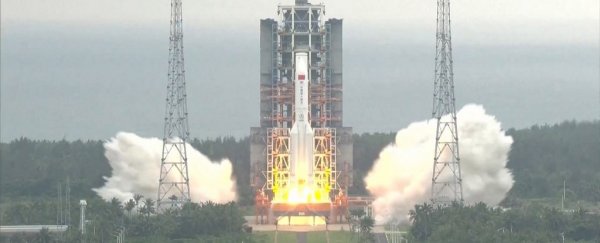The Pentagon has said it is tracking a chunk of a Chinese rocket that is expected to come back into the atmosphere in the coming days in an uncontrolled reentry.
As of now, it does not know where the debris will land.
The exact point where the rocket will enter the atmosphere will be known only within "hours" of its reentry, the US Space Command, a branch of the US military, said in a statement Tuesday.
The core of the rocket, which China launched April 29, has been predicted to come back to Earth "around May 8", Space Command said. Its exact trajectory is still unclear.
The rocket is in orbit and will be falling back to Earth uncontrolled, Insider's Morgan McFall-Johnsen reported Saturday.
The Harvard astrophysicist Jonathan McDowell told CNN that the rocket was traveling at 29,000 km/h (18,000 mph), which means a tiny change to its orbit would change its trajectory significantly.
Based on the rocket's current orbit, the debris could fall as far north as New York, Madrid, or Beijing and as far south as southern Chile or Wellington, New Zealand, Reuters reported.
Much of the rocket is likely to burn up on reentry, but experts are concerned some debris might reach Earth.
Though it could hit a populated area, it is far more likely that it won't. Most of the Earth's surface is ocean, and much of its land is uninhabited.
McDowell told CNN the risk of the debris causing damage was "pretty small".
But it is not null. Last time a Chinese Long March 5B rocket, similar to the one that was launched this time, reentered the atmosphere, debris reportedly landed on buildings in two villages in Ivory Coast.
McDowell told Space News that letting debris reenter the atmosphere uncontrolled was "unacceptable".
"Since 1990 nothing over 10 tons has been deliberately left in orbit to reenter uncontrolled," he said.
The core of the rocket is thought to weigh about 21 tons.
Answering a reporter's question about the Chinese rocket on Wednesday, the White House press secretary, Jen Psaki, said the US was "committed to addressing the risks of growing congestion due to space debris."
The Long March 5B rocket was carrying the first component of China's space station, which China aims to complete by 2022.
The launch was one of 11 planned missions to build the station, Insider's Morgan McFall-Johnsen reported on April 29.
This article was originally published by Business Insider.
More from Business Insider:
